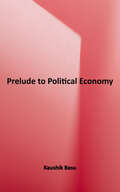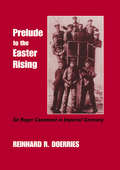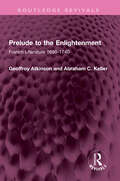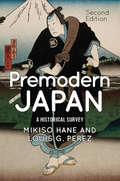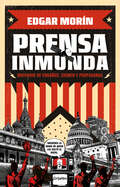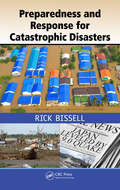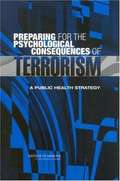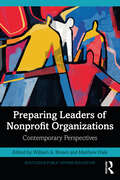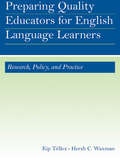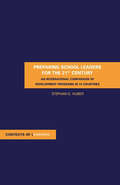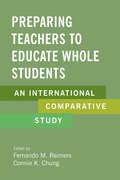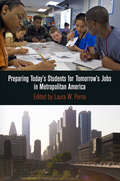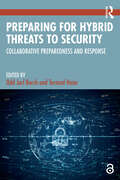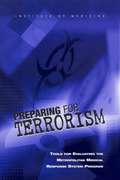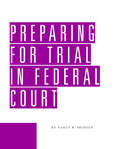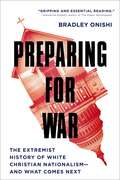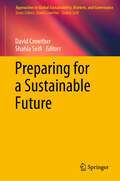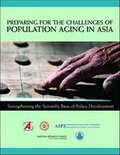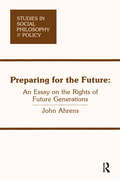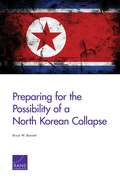- Table View
- List View
Prelude to Civil War: 1816-1836
by William W. FreehlingFrom the preface: "My reasons for presenting a re-examination of the Nullification Controversy go beyond a desire to clarify its causes. The crisis of 1832-3 is one of the more dramatic events in United States history, and has, I think, never been chronicled fully or accurately. Furthermore, the Nullification Crisis has usually been presented as an isolated event. Viewed in proper perspective, the confrontation between Andrew Jackson and the Carolina nullifiers was the central occurrence in the broader transition of South Carolina from the enthusiastic nationalism of 1816 to the extreme sectionalism of 1836. And I hope the following analysis of the acute anxieties surrounding the mere discussion of slavery during these years of transition will help to explain why South Carolina led the South in a suicidal assault on the federal Union a generation later."
Prelude to Political Economy: A Study of the Social and Political Foundations of Economics
by Kaushik BasuMainstream economics was founded on many strong assumptions. Institutions and politics were treated as irrelevant, government as exogenous, and social norms as epiphenomena. As an initial gambit this was fine. But as the horizons of economic inquiry have broadened, these assumptions have become hindrances rather than aids. If we want to understand why some economies succeed and some fail, why some governments are effective and others not, why some communities prosper while others stagnate, it is essential to view economics as embedded in politics and society. <p><p>Prelude to Political Economy is a study of this embeddedness; it argues for an 'inclusive' approach to institutions and the state. Modern economics recognizes that individuals' pursuit of their own selfish ends can result in socially suboptimal outcomes -- the Prisoner's Dilemma being the stark example. It has been suggested that what we need in such an eventuality is 'third-party' intervention, which can take the form of imposing punishment on players. Kaushik Basu objects to this method of wishing third parties out of thin air. He argues that if a third party that could impose its will on others were available, then it should have been modeled as a player to start with. <p><p>The adoption of such an inclusive approach has implications for our conception of the state and the law. It means that the law cannot be construed as a factor that changes the game that citizens play. It is instead simply a set of beliefs of citizens; and, as such, it is similar to social norms. What the law does for an economy, so can social norms. The book discusses how the nature of policy advice and our conception of state power are affected by this altered view of the state and the law. As corollaries, the book addresses a variety of important social and philosophical questions, such as whether the state should guarantee freedom of speech, whether determinism is compatible with free will, and whether the free market can lead to coercion.
Prelude to the Easter Rising: Sir Roger Casement in Imperial Germany (Women In Irish History Ser.)
by Reinhard R. DoerriesPrelude to the Easter Rising casts light upon the clandestine activities of Sir Roger Casement in Imperial Germany from 1914 to 1916.German military intelligence and the Imperial Foreign Office had far-reaching plans to use the Irish in the war against Britain. Radical Irish-American leaders were behind Casement's mission to Berlin. It took some time for the highly sensitive and idealistic Casement to realize that neither the German General Staff nor the Imperial Chancellor was able or willing to lend full military support to the Irish. When Casement began to see that the rising would be a bloody massacre, he left for Ireland to halt the fatal development and, if necessary, sacrifice his own honour and life.The carefully edited documents contained in this volume, mostly from the German Foreign Office archives in Bonn, present a full record of Casement's activities prior to Easter 1916. Over 80 years later, these papers have lost none of their emotional intimacy.
Prelude to the Enlightenment: French Literature 1690-1740 (Routledge Revivals)
by Geoffroy Atkinson Abraham C. KellerFirst published in 1971, Prelude to the Enlightenment is a study of the attitudes of French writers during the transition from the Classical Age to the Enlightenment. Professors Atkinson and Keller investigate the increasing vogue for emotionalism, weeping, and confession and attitudes towards love and morality. On a more intellectual plane, the approaches of authors of the time to literary questions and their treatment of the world of reality. This book presents wide range of quotations from many writers of the period 1690 to 1740 – among them Mativaux; l’Abbé Prévost; Saint-Evremond; the novelists Robert Chasles, Mme Aubin, Mme de Tencin and la Comtesse d’Aulnoy; the remarkable and little-known writer Jean Buvat, who worked as a copyist in the Royal Library and wrote the Journal de la Régence; and l’Abbé Pluche, author of Le Spectacle de la Nature. Some of these are well known, some virtually unheard of, but all provide clues to the character of the age. By combining their own comments with contemporary quotations, Professors Atkinson and Keller give modern readers a feeling for the atmosphere of the period that followed the Golden Age and a deeper appreciation of the literature of the Enlightenment itself.
Premier's State
by Ellen Whinnett Steve Bracks'In May 1994, while I was going through pre-selection for the seat of Williamstown, I sat down at my desk at home and I wrote a note. I was thirty-nine years old and in that note I mapped out what I hoped would happen in my life.'By the time he was forty-eight, Steve Bracks had achieved the goal he'd set himself nine years earlier. He was premier of Victoria. In A Premier's State he reflects on his ambition to make a difference, and how he reached his goal. He talks about his early childhood growing up in a conservative but impassioned family that supported the Democratic Labor Party, and about his gradual evolution from left-wing university radical to pragmatic centre-left premier. He reveals for the first time the background to his decision to take the party's leadership from his friend John Brumby in 1999—then to hand it back to John in 2007 when he sensationally resigned from office. He gives insights into how to run a successful government and how to manage the factions, and talks about everything from the impact of public life on his family, to forming minority government with independents.
Premodern Japan: A Historical Survey
by Mikiso HaneJapanese historian Louis Perez brings Mikiso Hane's rich and beloved account of early Japanese history up-to-date in this thoroughly revised Second Edition of Premodern Japan. The text traces the key developments of Japanese history in the premodern period, including the establishment of the imperial dynasty, early influences from China and Korea, the rise of the samurai class and the establishment of feudalism, the culture and society of the long Tokugawa period, the rise of Confucianism and Shinto nationalism, and finally, the end of Tokugawa rule. While the text provides many political developments through the early modern period, it also integrates the social, cultural, and intellectual aspects of Japanese history as well. Perez's updates to the text provide a comprehensive overview of the major social, political, and religious trends in premodern Japan as well as offering the most current scholarship.
Prensa Inmunda: Brevario de engaños, crimen y propaganda
by Édgar MorinEn estas páginas se asoman las profundas divisiones dentro del gremio periodístico, la servidumbre voluntaria, el espionaje o la vigilancia a la que ha sido sometido, su precariedad laboral y no pocas dificultades o conflictos para obtener información. Prensa inmunda es también un repaso por la compleja historia de la prensa mexicana, desde aquellos años de control total de la información hasta nuestros días, con una relación tirante como la que AMLO ha establecido con los medios. Engañar, manipular y controlar no es nada nuevo. A lo largo de la historia abundan ejemplos en los que se miente, se provocan emociones, se tergiversan cosas o se incita de modo más o menos sutil a modificar la conducta a través de la persuasión. La prensa no ha estado exenta de esto. Muchos medios han servido más como vehículo de propagación de las verdades de los gobiernos -un conducto de mensajes entre los poderosos-, que comovía de contacto entre los ciudadanos para la conformación de una mejor sociedad. En este atrevido ensayo, el autor nos conduce por el intrincado y muchas veces inmundo camino de la prensa, de los grandes medios y sus cotos de poder. A través de 13 capítulos nos entrega una suerte de manual con pistas para descifrar distintos trucos o mañas del poder político, económico, criminal y mediático que han complicado el que hacer de los periodistas.
Preparedness and Response for Catastrophic Disasters
by Rick BissellBased on a popular course for the FEMA Higher Education project, Preparedness and Response for Catastrophic Disasters provides important insight into plans to mitigate and respond to the devastation caused by large-scale catastrophic events. Hurricane Katrina provided clear evidence that these occurrences are both qualitatively and quantitatively d
Preparing For The Psychological Consequences Of Terrorism: A Public Health Strategy
by Committee on Responding to the Psychological Consequences of TerrorismThe Oklahoma City bombing, intentional crashing of airliners on September 11, 2001, and anthrax attacks in the fall of 2001 have made Americans acutely aware of the impacts of terrorism. These events and continued threats of terrorism have raised questions about the impact on the psychological health of the nation and how well the public health infrastructure is able to meet the psychological needs that will likely result. Preparing for the Psychological Consequences of Terrorism highlights some of the critical issues in responding to the psychological needs that result from terrorism and provides possible options for intervention. The committee offers an example for a public health strategy that may serve as a base from which plans to prevent and respond to the psychological consequences of a variety of terrorism events can be formulated. The report includes recommendations for the training and education of service providers, ensuring appropriate guidelines for the protection of service providers, and developing public health surveillance for preevent, event, and postevent factors related to psychological consequences.
Preparing Leaders of Nonprofit Organizations: Contemporary Perspectives (Routledge Public Affairs Education)
by William A. BrownThere are more than 1.8 million nonprofits in the United States and at least 3 times that many internationally. Workers in these nonprofits and civil society organizations increasingly look to academic programs to provide leadership and management training. This edited volume is designed to provide new and experienced faculty and program administrators with a broader conception of how the nonprofit leaders of the future are and could be educated. The chapters are written by experienced nonprofit program leaders who provide guidance on all aspects of building and more importantly maintaining a successful nonprofit program. Many of the chapters are written by former leaders of the nonprofit Academic Centers Council (NACC), a recognized international leader in nonprofit management curricular development, while others are written by successful founders and administrators of nonprofit programs both in the US and internationally. All chapters are however grounded in the experience of the authors, supplemented with research on best practices and focusing on future trends in the field.Preparing Leaders of nonprofit Organizations examines key issues and challenges in the fi eld from multiple perspectives, some of which are curricular and intellectual while others are related to program administration and oversight. The text explores core concepts, distils distinctive features of new or emerging academic programs, and identifies ways program leadership might ensure those features are reflected in their programs regardless of where these are housed within a university. The book is an essential resource for faculty and administrators who work with or are seeking to develop a nonprofit education program. It is also a useful guide for graduate students seeking a career in the nonprofit academy.
Preparing North Korean Elites for Unification
by Bruce W. BennettThis report examines what could be done to convince North Korean elites that unification would be good for them. It describes five areas of concern that North Korean elites would likely have about the outcomes of unification and proposes policies that the Republic of Korea government could adopt that would give North Korean elites hope for an acceptable unification outcome.
Preparing Quality Educators for English Language Learners: Research, Policy, and Practice
by Kip Téllez Hersh C. WaxmanThis volume brings together a broad range of academics, school-based educators, and policymakers to address research, policy, and practice issues related to improving the education of English language learners in U.S. schools today. It emphasizes throughout that instructional improvements cannot be achieved via curriculum alone--teachers are key to improving the education of this large and growing population of students. The focus is on the quality of preparation and development of pre-service and in-service educators.Contributors include leading educators and researchers in the field and from nationally recognized professional development programs. Their recommendations range from promising new professional development practices to radical changes in current state and federal policy.Preparing Quality Educators for English Language Learners is an important resource to help teacher educators, administrators, and policymakers address critical issues as they develop programs for English language learners.
Preparing School Leaders for the 21st Century (Contexts of Learning)
by Stephan Gerhard HuberThe quality and success of schools depend upon school leadership. Increasingly, in many countries worldwide, this belief has led to designing and implementing appropriate training and development programs for educational leaders. In an international comparative research project, current school leader training and development programs in fiftee
Preparing Students for College and Careers: Theory, Measurement, and Educational Practice
by Katie Larsen McClarty Krista D. Mattern Matthew N. GaertnerPreparing Students for College and Careers addresses measurement and research issues related to college and career readiness. Educational reform efforts across the United States have increasingly taken aim at measuring and improving postsecondary readiness. These initiatives include developing new content standards, redesigning assessments and performance levels, legislating new developmental education policy for colleges and universities, and highlighting gaps between graduates’ skills and employers’ needs. In this comprehensive book, scholarship from leading experts on each of these topics is collected for assessment professionals and for education researchers interested in this new area of focus. Cross-disciplinary chapters cover the current state of research, best practices, leading interventions, and a variety of measurement concepts, including construct definitions, assessments, performance levels, score interpretations, and test uses.
Preparing Teachers to Educate Whole Students: An International Comparative Study
by Fernando M. Reimers and Connie K. ChungPreparing Teachers to Educate Whole Students offers a wide-ranging comparative account of how innovative professional development programs in a number of countries guide and support teachers in their efforts to promote cognitive and socio-emotional growth in their students. The book focuses on holistic educational outcomes in an effort to better serve students in the twenty-first century and examines seven programs in all—in Chile, China, Colombia, India, Mexico, the United States, and Singapore. Fernando M. Reimers, Connie K. Chung, and their contributors focus on a pair of issues of great significance to educators throughout the world: the need to identify and promote a full range of competencies in students as they prepare for work and life in the twenty-first century, and the need to create and enhance professional development programs for teachers that will help them cultivate these competencies in their students. Preparing Teachers to Educate Whole Students offers a unique and helpful contribution to our understanding of fundamental educational goals and the professional development programs for teachers that aim to further those goals.
Preparing Today's Students for Tomorrow's Jobs in Metropolitan America
by Laura W. PernaEducation, long the key to opportunity in the United States, has become simply essential to earning a decent living. By 2018, 63 percent of all jobs will require at least some postsecondary education or training. Teachers and civic leaders stress the value of study through high school and beyond, but to an alarmingly large segment of America's population--including a disproportionate number of ethnic and racial minorities--higher education seems neither obtainable nor relevant. Preparing Today's Students for Tomorrow's Jobs in Metropolitan America, edited by Laura W. Perna, offers useful insights into how to bridge these gaps and provide urban workers with the educational qualifications and skills they need for real-world jobs.Preparing Today's Students for Tomorrow's Jobs in Metropolitan America probes more deeply than recent reports on the misalignment between workers' training and employers' requirements. Written by researchers in education and urban policy, this volume takes a comprehensive approach. It informs our understanding of the measurement and definition of the learning required by employers. It examines the roles that different educational sectors and providers play in workforce readiness. It analyzes the institutional practices and public policies that promote the educational preparation of today's students for tomorrow's jobs. The volume also sheds light on several recurring questions, such as what is the "right" amount of education, and what should be the relative emphasis on "general" versus "specific" or "occupational" education and training?Ensuring that today's students have the education and training to meet future career demands is critical to the economic and social well-being of individuals, cities, and the nation as a whole. With recommendations for institutional leaders and public policymakers, as well as future research, this volume takes important steps toward realizing this goal.
Preparing for Digital Disruption (Research for Policy)
by Erik Schrijvers Corien Prins Reijer PasschierThis open access book offers an analysis of why preparations for digital disruption should become a stated goal of security policy and policies that aim to safeguard the continuity of critical infrastructure. The increasing use of digital technology implies new and significant vulnerabilities for our society. However, it is striking that almost all cyber-security measures taken by governments, international bodies and other major players are aimed at preventing incidents. But there is no such thing as total digital security. Whether inside or outside the digital domain, incidents can and will occur and may lead to disruption. While a raft of provisions, crisis contingency plans and legal regulations are in place to deal with the possibility of incidents in the ‘real world’, no equivalence exists for the digital domain and digital disruption. Hence, this book uniquely discusses several specific policy measures government and businesses should take in order to be better prepared to deal with a digital disruption and prevent further escalation.
Preparing for Hybrid Threats to Security: Collaborative Preparedness and Response
by Tormod Heier Odd Jarl BorchThis book examines hybrid threats within the broader context of a security crisis in Europe.As geopolitical tensions increase and great power rivalries intensify, can states protect their communities? While conventional wars are fought, parallel battles take place by more subtle and non-violent means. This multi-disciplinary book examines how hybrid threats undermine political governance and social stability in liberal democracies, covering aggressors, targeted states and victimized communities. It seeks to address how aggressor states undermine liberal democracies under the threshold of conflict, and the role played by hybrid threats as aggressor states prepare for full-scale war. The chapters also explore how liberal democracies organize and interact to detect hybrid threats, arguing that, in order to increase resilience, politicians and government agencies must involve the private sector and citizens in threat-reduction policies. The analysis builds upon the latest research in the international crisis management literature.This book will be of interest to students of security studies, hybrid warfare, defence studies and International Relations, as well as professional practitioners.The Open Access version of this book, available at http://www.taylorfrancis.com, has been made available under a Creative Commons Attribution (CC-BY) 4.0 license.
Preparing for Terrorism: Tools for Evaluating the Metropolitan Medical Response System Program
by Committee on Evaluation of the Metropolitan Medical Response System ProgramThe Metropolitan Medical Response System (MMRS) program of the U. S. Department of Health and Human Services (DHHS) provides funds to major U. S. cities to help them develop plans for coping with the health and medical consequences of a terrorist attack with chemical, biological, or radiological (CBR) agents. DHHS asked the Institute of Medicine (IOM) to assist in assessing the effectiveness of the MMRS program by developing appropriate evaluation methods, tools, and processes to assess both its own management of the program and local preparedness in the cities that have participated in the program. This book provides the managers of the MMRS program and others concerned about local capabilities to cope with CBR terrorism with three evaluation tools and a three-part assessment method. The tools are a questionnaire survey eliciting feedback about the management of the MMRS program, a table of preparedness indicators for 23 essential response capabilities, and a set of three scenarios and related questions for group discussion. The assessment method described integrates document inspection, a site visit by a team of expert peer reviewers, and observations at community exercises and drills.
Preparing for Trial in Federal Court
by Nancy PridgenIncrease your efficiency and effectiveness with this federal trial preparation system. This step-by-step shop manual takes you post-pleadings through trial. Loaded with thoughtful practice tips and proven forms, and organized by preparation task, Preparing for Trial in Federal Court literally gives you the what, why, when, and how of readying a federal case for trial: * What and Why: Plain English explanations, detailing related rules and case law, along with the reasons for considering the task. * When: A thorough discussion of the steps to be completed prior to beginning the task, along with deadlines for the task. * How: Detailed steps necessary to effectively complete each task. Includes defenses against the efforts of your opponent. * Practice Notes: Strategies, arguments, cautions, and advice learned from decades in the courtroom. This book also contains over 150 custom-drafted forms that will speed up your drafting assignments: * Discovery motions & memoranda * Interrogatories & objections * Production requests * Requests for admission & responses * Witness preparation checklists * Dispositive motions & memoranda * Motions in limine
Preparing for War: The Extremist History Of White Christian Nationalism--and What Comes Next
by Bradley OnishiWatching the eerie footage of the January 6 insurrection, Bradley Onishi wondered: if i hadn't left evangelicalism, would i have been there? The riot at the US Capitol on January 6, 2021, was not a blip or an aberration. It was the logical outcome of years of a subculture's preparation for war. In Preparing for War, religion scholar and former insider Bradley Onishi maps the origins of White Christian nationalism and traces its offshoots. Combining his own experiences in the youth groups and prayer meetings of Orange County, California, in the 1990s with an immersive look at the steady blending of White grievance politics with evangelicalism, Onishi crafts an engrossing account of the years-long campaign of White Christian nationalism that led to January 6. How did the rise of what Onishi calls the New Religious Right, between 1960 and 2015, give birth to violent White Christian nationalism during the Trump presidency and beyond? What propelled some of the most conservative religious communities in the country--communities of which Onishi was once a part--to ignite a cold civil war? Through chapters on White supremacy and segregationist theologies, conspiracy theories, the Christian-school movement, purity culture, the right-wing media ecosystem, and the migration of many White Christians to Idaho, Montana, and Wyoming in what is known as the American Redoubt, Onishi pulls back the curtain on a subculture that birthed a movement and that has taken a dangerous turn. Learning the troubling history of the New Religious Right and the longings and logic of White Christian nationalism is deeply alarming. It is also critical for preserving the shape of our democracy for years to come. DR. BRADLEY ONISHI is a scholar of religion and cohost of the Straight White American Jesus podcast. His writing has been published in the New York Times, LA Review of Books, and Religion & Politics, among other outlets. He holds degrees from Azusa Pacific University, Oxford University, and L'institut catholique de Paris, and he received his PhD from the University of California at Santa Barbara. A TEDx speaker and the author, editor, or translator of four previous books, Onishi teaches at the University of San Francisco and lives in the Bay Area with his wife and daughter.
Preparing for a Sustainable Future (Approaches to Global Sustainability, Markets, and Governance)
by David Crowther Shahla SeifiThe term sustainability has become one of the most significant in the current era. It seems to be ubiquitous amongst academics, politicians, business leaders, media personnel and even the general public. It is no exaggeration to state that it is considered all over the world to be the most pressing issue to be addressed for the long-term future of the planet and its inhabitants. The topic is of course complex, and the issue of sustainability is under much debate as to what it actually is and how it can be achieved, but it is completely certain that the resources of the planet are fixed in quantity and, once used, cannot be reused except through being reused in one form or another. At present, much of the discourse of sustainability has focused upon the environment and in particular upon climate change and the effects that this is having. Thus, the discourse has tended to be about mitigation.Sustainability of course requires all three pillars of the triple bottom line—economic, environmental and social—to be addressed. Indeed, it might be considered that the effects upon the social, and how we choose to live our lives, might well be the most profound effect of achieving sustainability. This book therefore focuses upon some of the many aspects of the social and how we can adapt our lives to accommodate the requirements of sustainability. it therefore takes a very different approach to addressing the issues of sustainability, while of course not ignoring the other pillars.This book therefore sets out to examine various aspects of the changes to personal, corporate and institutional behaviour which may have to come about in our search for sustainability. It is tended to address some of the issues and how they are being dealt with in various parts of the world. As always, our concept is to share best practice and thereby enrich both the discourse and our progress towards sustainability. Thus, we focus upon the current situation while also considering the extent to which the focus is changing so much that we need to think about new approaches to our understanding of behaviour and differing effects in practice. The international origins of the contributors to this book make this an original contribution taking some of the best ideas from around the world.This book therefore addresses these issues from a perspective not generally addressed by researchers, or even by politicians and the press. It therefore provides fresh perspectives upon the important issue of our common future. As always, this approach is based on the tradition of the Social Responsibility Research Network srrnet.org (a worldwide body of scholars with membership of several thousand), which in its 20-year history has sought to broaden the discourse and to treat all research as inter-related and relevant to business. This tradition has always been to explore the subject widely and to seek relevant solutions, while also sharing best practice. This book is based primarily upon some of the contributions from the network at our recent conference and shows both commonality and diversity in approaches and effects.
Preparing for the Challenges of Population Aging in Asia: Strengthening the Scientific Basis of Policy Development
by Chinese Academy of Social Sciences"Preparing for the Challenges of Population Aging in Asia" discusses the challenges posed by a rapidly aging population and identifies needed research to help policymakers better respond to them. While the percentage of elderly people in nearly every nation is growing, this aging trend is particularly stark in parts of Asia. Projections indicate that the portion of the population age 65 and older will more than triple in China, India, and Indonesia and more than double in Japan between 2000 and 2050, based on data from the United Nations. Moreover, this demographic shift is coinciding with dramatic economic and social changes in Asia, including changing family structures and large-scale migrations from rural to urban areas. These trends raise critical questions about how nations can develop policies that best support health and economic well-being in large and growing populations at older ages. Governments in Asia still have time to determine the best ways to respond to the unfolding demographic transformation, but taking advantage of this window of opportunity will require new research to shed light on the status and needs of the aging population. Currently the research base on aging in this region is relatively underdeveloped. This book identifies several key topics for research to inform public policy, including changing roles in the family; labor force participation, income, and savings; and health and well-being of the public.
Preparing for the Future: An Essay on the Rights of Future Generations
by John AhrensDoes the present generation have a moral obligation to conserve resources for future generations? Must we accept drastic reductions in our standard of living, and give up the ideals of individual liberty and technological progress in order to preserve the environment? PREPARING FOR THE FUTURE offers an unfashionably optimistic answer to these questions: that future generations cannot have a right to a share of existing resources, because only living persons can have rights. Rejecting the sacrifices that most traditional ethical principles would require of us, it advocates, instead, that members of the present generation may legitimately use all of the resources at their disposal to realize their own values.
Preparing for the Possibility of a North Korean Collapse
by Bruce W. BennettA North Korean government collapse would have serious consequences, including a humanitarian disaster and civil war. The Republic of Korea and the United States can help mitigate the consequences, seeking unification by being prepared to deliver humanitarian aid in the North, stop conflict, demilitarize the North Korean military over time, secure and eliminate North Korean weapons of mass destruction, and manage Chinese intervention.

